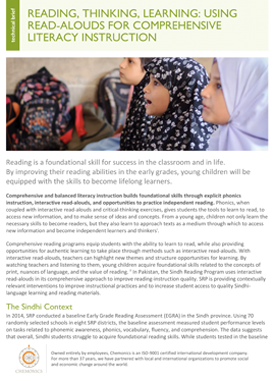Sindh, Pakistan’s second largest province, has made recent economic progress, but its education indicators are still low, with about 4 million children ages 5 to 12 not in school.

Reading, Thinking, Learning: Using Read-Alouds for Comprehensive Literacy Instruction .
Technical Brief | October 31, 2017

To encourage a culture of reading in classrooms, the USAID Pakistan Sindh Reading Program used the “reading is thinking” approach, which embeds elements of critical thinking into weekly read-alouds.
Comprehensive reading programs equip students with the ability to learn to read, while also providing opportunities for authentic learning to take place through methods such as interactive read-alouds. With interactive read-alouds, teachers can highlight new themes and structure opportunities for learning. By watching teachers and listening to them, young children acquire foundational skills related to the concepts of print, nuances of language, and the value of reading. In Pakistan, the Sindh Reading Program (SRP) used interactive read-alouds in its comprehensive approach to improve reading-instruction quality. SRP provided contextually relevant interventions to improve instructional practices and to increase student access to quality Sindhi-language learning and reading materials.
